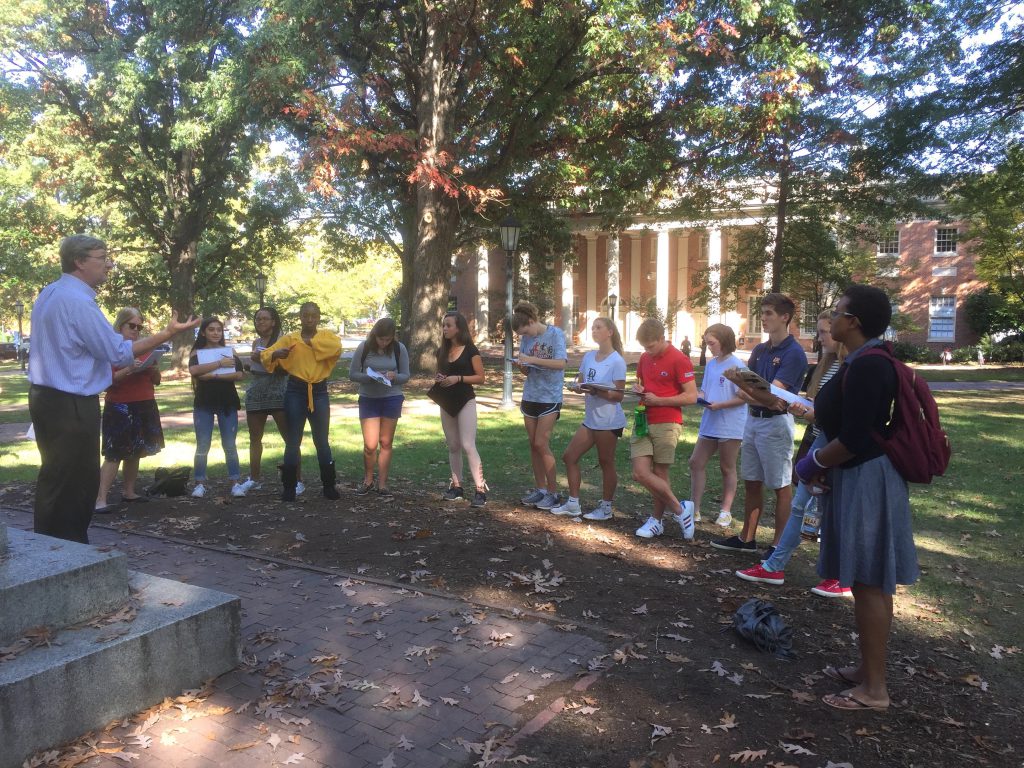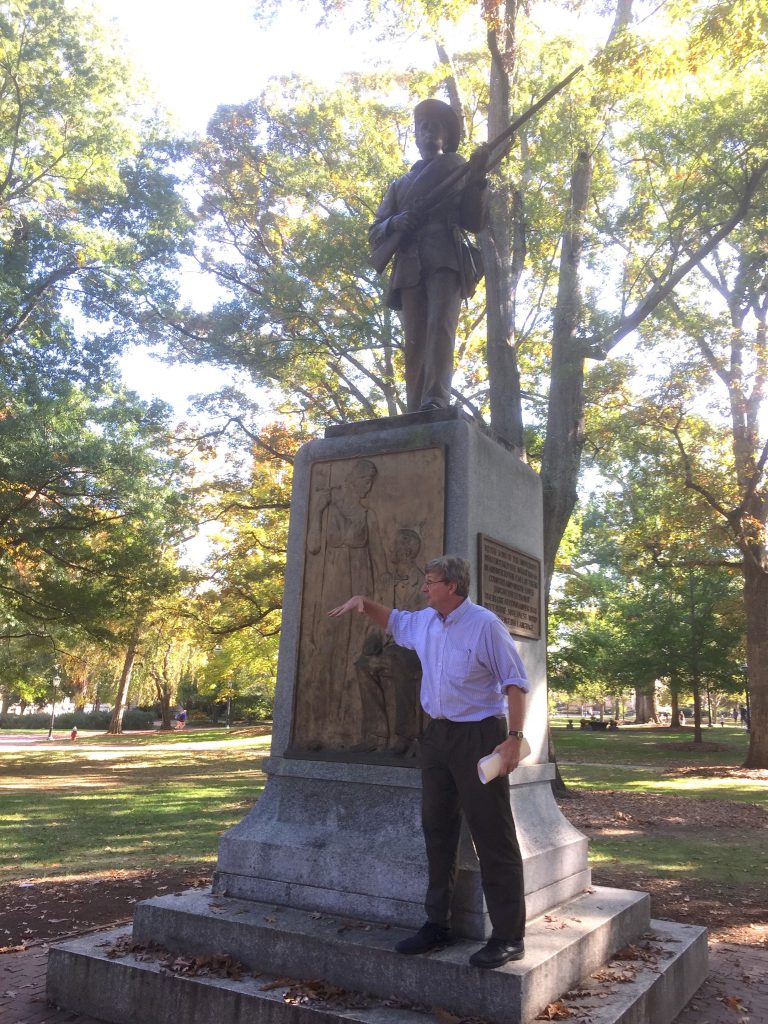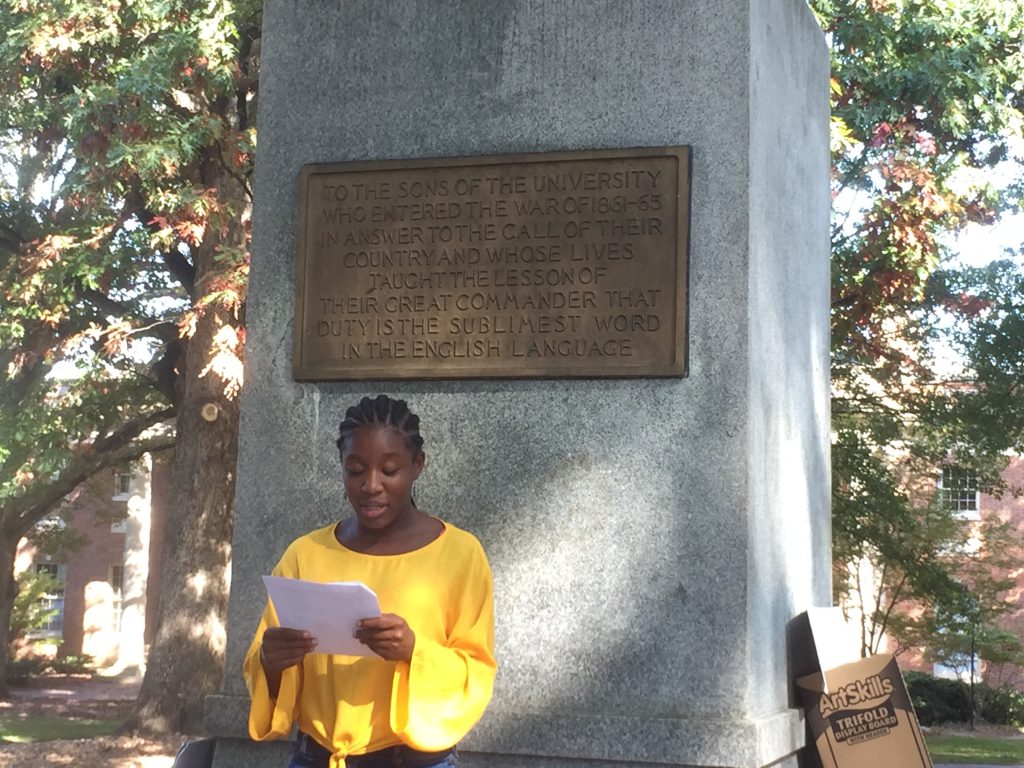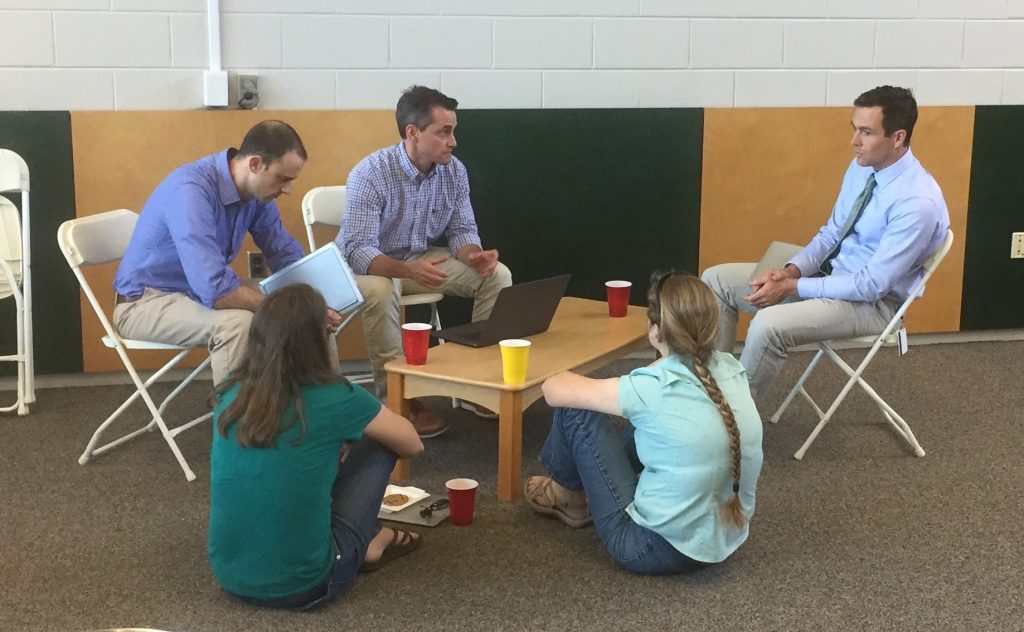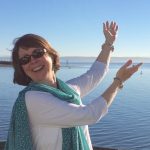How to Use Online Learning to Enhance On-Campus Conversations
On occasion, GOA will invite guest contributors to the blog. Here, teacher and blended learning coach Tina Bessias of Durham Academy shares her experience engaging her community.
When we think of “blended learning,” we often begin with our face-to-face classes: how might digital elements augment in-person learning?
This fall, at Durham Academy, we did the opposite: to enhance online learning experiences offered by Global Online Academy, we created face-to-face experiences.
I think a lot about how technology and online environments can make learning more relevant and more engaging. As an English teacher, I began in the pre-digital era and gradually incorporated digital tools as they became available. I created my school’s first website for teaching in 1999 and piloted the use of our first learning management system a few years later. More recently, I have been teaching online courses for GOA and serving DA as a Blended Learning Coach. When recent opportunities arose to engage both students and my colleagues in online learning, I knew figuring out how to weave those online experiences into life at my school would ensure deeper learning and engagement.
Making it Matter for Students
I was excited about the flex course “Do Monuments Matter?”, a two-week online course that brought together 300 students and educators from around the world to investigate the stories and issues behind monuments in their local communities, and wanted to encourage students to participate. The question, of course, was how to weigh that opportunity against the value of existing, carefully laid plans on campus — we couldn’t just add those hours without subtracting elsewhere. And, in the case of the “Monuments” course, there was an additional obstacle for Durham Academy: the topic felt almost radioactive. A few weeks after the events in Charlottesville, Virginia, in the summer of 2017, Durham made the national news when a Confederate monument was toppled by a crowd, and there were ongoing demonstrations at the site of another monument in nearby Chapel Hill. Giving students an opportunity to study these phenomena seemed excellent; requiring it in a course seemed risky. We couldn’t know how peers far or near might respond to our students, and, in our politically diverse school, we couldn’t know how our own students would respond to each other.
The solution was to offer optional participation in the online course and blend it with the physical presence of a teacher and a group of learners. At Durham Academy, there is a longstanding seminar program that affords interested students the chance to spend 1-2 days exploring a topic of current interest. I adapted that structure to spread seminar time over the two weeks of the GOA course.
Interested students and teachers met five times. At those meetings, we individually explored playlists of resources, shared observations and questions, and collectively watched videos by online teachers and guest speakers. Not everyone completed the whole course, but all became familiar with the purpose and impact of monuments in Berlin, Rwanda, and Wichita. One student remarked, “This makes me want to get so much more involved in my community!”
On the last day, we took a 2-hour field trip to the University of North Carolina campus to observe the confederate monument colloquially known as “Silent Sam.” American Studies professor Tim Marr (husband of a DA faculty member) gave us a lecture about the monument’s history and current status. When he asked for a volunteer to read the dedication speech aloud, it was a student from a Caribbean immigrant family who stepped up. We heard that speech on multiple levels as she read.
Learn more about GOA’s next flex course for students: “Designing Decisions.”
Finding Time for Faculty to Connect
Could a similar approach be useful for teachers and administrators taking an online professional development course? Our Head of School, Michael Ulku-Steiner, issued an invitation to join him in taking GOA’s one-week course, “Rethinking School” in October. Twenty-nine of my colleagues signed up. Those who participated engaged in online discussions of assessment, proficiency-based learning, and the many ways to carve up the school day.
To capture some of this thinking and facilitate its application to our school, I organized a Friday afternoon reception and invited all the participants to continue the conversation in person. In loosely organized discussion groups, ten teachers and administrators got together to share ideas and capture them in a shared document titled “Bringing ‘Rethinking’ to DA.” Ideas ranged from the practical (trying out new schedules, strategies for dealing with grade inflation, the influence of AP courses) to the philosophical (the meaning of mastery, the role of anxiety).
This was a shorter, more broadly focused experience than the monuments course, but it helped to meet the goal of generating shared experience and vocabulary. Furthermore, it helped us make use of the opportunity GOA was offering. I don’t know what will become of the ideas we discussed, but I count the experience as a small step in preparing for the unknown future of education. Plus, it is always fun to compare notes with colleagues!
Learn more about GOA’s next pop-up course for educators: “Learning Now.”
Tina Bessias is an English teacher and blended learning coach at Durham Academy in Durham, NC, USA. She developed and taught one of GOA’s Learning Studios, Water: From Inquiry to Action. She would love to hear from other educators about their experiences. You can reach her at tina.bessias@da.org or follow her on Twitter @tbessias.
Global Online Academy (GOA) reimagines learning to empower students and teachers to thrive in a globally networked society. Professional learning opportunities are open to any educator. To sign up or to learn more, see our Professional Learning Opportunities for Educators or email hello@GlobalOnlineAcademy.org with the subject title “Professional Learning.” Follow us on Twitter @GOALearning. To stay up to date on GOA learning opportunities, sign up for our newsletter here.
